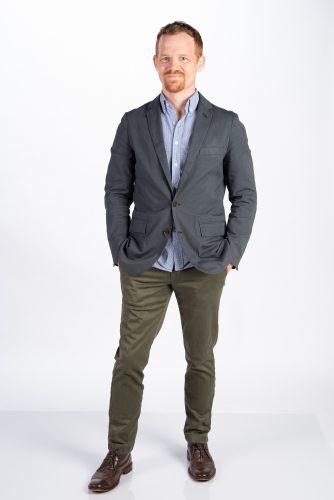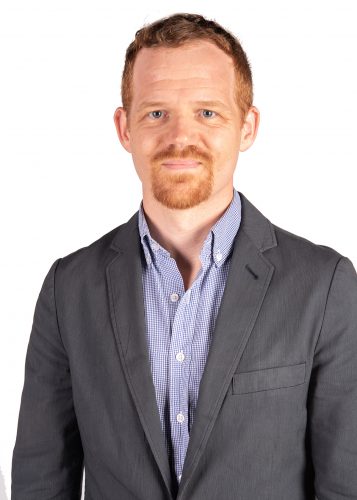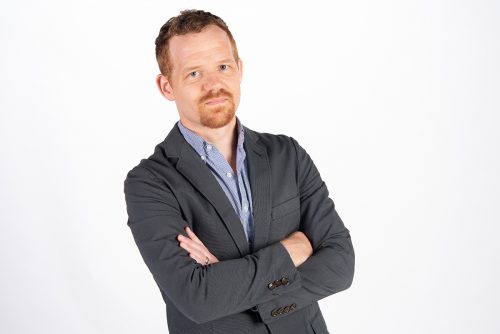Sam Arnold Challenges Students to See Politics from Different Vantage Points
In a Q&A, the political scientist talks about leading his class in discussions on justice and social cooperation.
Sam Arnold Challenges Students to See Politics from Different Vantage Points
In a Q&A, the political scientist talks about leading his class in discussions on justice and social cooperation.

Sam Arnold, associate professor of political science, looks to research in political psychology to discuss power influences. Photo by Glen E. Ellman
After studying the systems dictating how human society shares resources and power, the political philosopher and associate professor of political science chose to advocate for a simpler, less consumer-driven lifestyle.
Most people would agree that the world exists today with unbalanced power, economically, politically and racially. How can political science help people examine the way power shapes society’s evolution?
This is exactly what political philosophy exists to do. The conclusion isn’t foregone, though, because maybe asymmetries of power are OK in some cases. The mere fact that some people have more power than others isn’t automatically unjustified. The librarian at TCU has power over me relative to the books I’ve taken out. He or she can fine me — that’s OK. Politicians have power over us. And in the ideal case, that’s fine because we put them there.
A big part of political philosophy’s purpose is to investigate power relationships and help us think through the standards that apply to them, to separate the unproblematic cases of power from the problematic cases of power. Human beings are all moral equals, meaning nobody has natural authority over anybody else. This is foundational to the whole train of thought, starting with the Enlightenment. And given that we’re moral equals, all power relationships are sort of suspect. We should look at them and see if they’re justified.
How do ideas about power influence political beliefs?
There’s some interesting research in political psychology about this, that people vary in their innate feelings about authority. Some people are just more comfortable with authority than others. They gravitate toward strong, authoritarian leadership, and there’s some plausible evidence that this is genetically based. Whereas people who are more anti-authority are going to be more suspicious of power hierarchies.
But one can go too far in criticizing society and in criticizing power structures. I read a really interesting article recently in Quillette, which is an online magazine that is committed to defending free speech on campus. A left-wing history professor realized that to foster critical thinking in his students, the old recipe of assigning more left-wing stuff that was critical of society was no longer sparking critical thought. Because the “everything’s terrible” narrative is now kind of a dominant narrative.
The key thing for pedagogical purposes is to provide a counternarrative. Whatever the main default view is in society, political philosophers need to expose students to the opposite. It’s the Socratic method, really. The whole point of philosophy is to examine your beliefs and see if they survive rational scrutiny. If most students come into college thinking everybody’s racist, capitalism’s horrible and men are pigs, then to get them thinking critically you need to challenge those views. In my classes, I bend over backward to assign stuff from across the ideological spectrum.
Political philosophy doesn’t exist in a political science vacuum. What is the connection between political theory and more psychological notions of empathy or beliefs about individual independence?
One of my philosophical heroes is John Rawls. His most famous contribution to political philosophy was this idea of the original position and the veil of ignorance. This was a way to construct principles of justice that would resonate with everybody, regardless of how empathetic they were.

Sam Arnold’s approach to political science pedagogy includes studying power relationships. Photo by Glen E. Ellman
Imagine you’re behind a veil of ignorance, meaning you don’t know anything about yourself. You don’t know your gender. You don’t know how rich you are or your race. You don’t know if you’re able-bodied or disabled. You also don’t know how empathetic you are, how risk-averse you are, etc. What kind of society would you want to live in? What principles would you pick to govern society? His hypothesis was that this method would provide an objective way of getting at the truth about justice without relying on contingent psychological features.
One of your research specialties is alternatives to consumer capitalism. Most people are probably familiar with Margaret Thatcher’s phrase, “There is no alternative.” Was she wrong?
Yes, she was wrong. I will confidently proclaim that. At the system level, Margaret Thatcher was not alone in saying there’s no alternative to consumer capitalism. I think the reason is that the alternative is defined as Soviet Union-style command economies. And those don’t work. They lead to the dangerous concentration of power and authoritarianism. They’re objectionable morally. And they’re also just bad economically. They don’t lead to prosperity.
But a lot of philosophers have been arguing for a different kind of socialism called market socialism. It basically takes the best part of capitalism, markets — not private property and the means of production, but markets — and marries those to some of the best parts of socialism. The idea is that we don’t have a society where a tiny elite owns all the stuff. It’s a society where ownership is broadly spread and mostly equal.
We’ve got markets, and we’ve got firms trying to make money. It should work, and it should be way more equal. And because we would have more collective control over the economy, we could slow the pace of economic life. We could put policies in place that make it possible to work 30 hours a week and still live comfortably. We could not have everything saturated with advertising.
“Most people spend the better part of their lives working in jobs that don’t particularly fulfill them. This doesn’t apply to everybody, but it applies to a lot of people.”
Sam Arnold
On the individual level, I’ve gotten really interested lately in the topic of voluntary simplicity. This is a consciously anti-consumer lifestyle. I got interested in it after reading Thoreau’s Walden (1854). The way of life it gestured toward seemed pregnant with possibility. Thoreau moved to the shores of Walden Pond, where he tried to provide for most of his needs himself and live as simply as possible so that he could focus on what really mattered.
By working about six weeks out of the year growing beans, he could take care of all of his basic needs and have the whole rest of the year for what really mattered to him. The point wasn’t to be wholly independent or solitary. The point was to minimize the amount of time he spent doing stuff that didn’t really matter to him and to maximize the amount of space left over in his life to pursue what did matter.
Most people spend the better part of their lives working in jobs that don’t particularly fulfill them. This doesn’t apply to everybody, but it applies to a lot of people. Even if they wouldn’t want to give up work entirely, most people would prefer to work less. A lot of people would say, “If I could live comfortably on 15 hours of work a week, sign me up for that.” So that’s the basic idea behind voluntary simplicity: You structure your life so that you can meet your basic needs with a minimum amount of time spent working and have the better part of your life to devote to what matters to you.
You have a longstanding interest in socialism, so we have to ask: Karl Marx’s proletariat never rose up to seize control. In fact, even people at the bottom of the economic spectrum in the developed world seem relatively happy in their capitalistic ways. Was Marx wrong, or is the story more complicated?
I think Marx was wrong, but it depends on how long we’re going to give him for his prediction to come true. If his prediction was that capitalism will be overthrown in the next 50 years, that obviously didn’t happen, across the West anyway. But if instead it was a more open-ended prediction that capitalism has certain inherent destabilizing tendencies such that it can’t go on forever, well, obviously the jury’s still out.

Sam Arnold talks about capitalism, a shorter work week and what Karl Marx got wrong. Photo by Glen E. Ellman
There are some developments that Marx did not anticipate that have made capitalism more stable. Marx thought capitalism would inevitably create a super-rich elite, which it seems to have done, but that it also would create a super-exploited, immiserated poor class. At least in the developed world, that latter claim has not seemed to be the case. Instead, to some extent anyway, a rising tide has seemed to lift all boats. Working people in our country are, by and large, not immiserated.
That matters for the prediction about capitalism going away. If you are working 60 hours a week in a mill, and you can barely put food on the table, eventually you’re going to rise up. However, if you’re working 40 hours a week in a fairly nice office job on a reasonable salary, and you have two cars and you live in an OK place, and your kids are in soccer camps, it’s no longer in your material interest in any immediate sense to overthrow the system, even if it’s true that there exists another alternative which would be better for you. The transition costs don’t seem worth it.
Marx was wrong about what happens to the very worst off, at least in the developed world. And that’s a key caveat, because with the globalization of capital, arguably what has happened is that capital does immiserate, but it just has moved the immiserating offshore. Defenders of capitalism will say that’s crazy. If you look at what’s happened in countries like China, actually, as they become more capitalist, they have dramatically reduced poverty. So there’s some truth to that too.
Marx wrote about the opiate of the masses being religion, but we’re becoming increasingly secular. Now the opiate of the masses is iPhones and all the screens that we look at all the time. We have all of our consumer desires satisfied constantly, and we’re distracted all the time just thinking about the next electronic fix. And when you’re playing Candy Crush 10 hours a day, you don’t have time to overthrow the system.
But don’t capitalism’s free markets really mean fair opportunities for everyone?
Free labor markets — the idea that jobs will be open to all comers and awarded on a meritocratic basis — are really important for opportunity. Practices like hiring people in the family or restricting the type of work women can do are limitations on free labor markets.
But the idea that free markets alone suffice for fair opportunity is not credible. Just think of a poor kid born to a single-parent household in a poor part of Fort Worth versus a kid born in [wealthier] Southlake, Texas, to great affluence with two parents. The kid from Southlake is obviously going to have, other things equal, more opportunity in life. This is inarguable.
“Truly equal opportunity means, at the very least, neutralizing the effects of the social lottery on your life prospects.”
Sam Arnold
Often people say, “Well, look, I know somebody who climbed out of that situation.” And, of course, that’s true. But that’s not the issue. The issue is the probability of climbing out of the situation. The claim is not that it’s impossible to move from a poor part of Fort Worth to being wealthy. The claim is that it’s a lot harder if you start there than if you start in Southlake.
Everybody says they’re for equal opportunity. But when you think about what that means, it gets kind of radical pretty quickly because it can’t just be free labor markets, the absence of discrimination. When you show up on Earth, you get two lottery tickets. You get a social lottery ticket: How wealthy is your family? What’s your family like? What are the schools like in your area? What’s the health care like for you? You also get a natural lottery ticket: What are your genetic advantages and disadvantages?
And truly equal opportunity means, at the very least, neutralizing the effects of the social lottery on your life prospects. Free markets alone can’t possibly do that. To realize equal opportunity clearly requires redistribution. We need to tax wealthier people and redistribute that tax to school districts and pay for adequate health care for people who can’t afford it and have early intervention programs and special education and all sorts of things that cost money.
What is the relationship between capitalism and freedom? A lot of people claim that capitalism provides the freest economic system a human can exist in. Is this accurate? Or are certain perspectives being left out of this assumption?
Milton Friedman famously argued that capitalism and freedom went together quite nicely and that any deviation from capitalism would automatically lead to reduction in freedom. He had a good point, which was, basically, when you centralize all the economic power in the hands of the people with all the political power, as they did in the Soviet Union, that is a recipe for tyranny.
One good part about capitalism is the way that it creates multiple centers of economic power. There are different corporations. In theory, anybody could open a business. Anybody, in theory, could get rich. So insofar as wealth is power, and anybody could, in theory, become wealthy, you can get a lot of different sources of power.
That’s all true enough. But in real-life capitalism, economic power does tend to get pretty concentrated. This is something that people often fail to appreciate. A lot of my students, when we talk about this, they don’t see right away how economic power threatens freedom. When some people own the stuff that the rest of us need, that gives them power over us. It invades our freedom. It gives them the ability to dictate terms to us.
This is really obvious in individual cases: If you and I were the only people on a desert island and you had the only food source, I would basically be your slave. You could tell me to do anything, and I would have to do it just to survive. Ownership, obviously, confers power. And that undermines freedom.
Under capitalism, things aren’t that dire. It’s not like businesspeople have that kind of power over workers. But it’s not a totally inapt analogy either. Businesses can get people to do an awful lot of things that they wouldn’t otherwise do and that are contrary to their interests: violation of labor laws, locking workers into stores after hours, wage theft, exploitatively low wages, etc. Why do people agree to work in a poultry plant? Because they don’t have better options. And why don’t they have any better options? Because most of the stuff is owned by the top. So, yeah, in that sense, I think capitalism does undermine freedom.
You teach courses about justice. What is it about this topic that you want your students to learn?
First of all, that the question matters. At the broadest level, principles of justice describe what a fair distribution of the benefits and burdens of social cooperation would be — everything from income and wealth to opportunity to access to meaningful work, rights and liberties, etc.

Sam Arnold says political science can help people examine the way power shapes society. Photo by Glen E. Ellman
Across the ideological spectrum, everybody wants to know what a fair distribution of those benefits and burdens would be like. Is it fair that 80 percent of the wealth is owned by the top 20 percent? Is it fair that some people get to do relatively interesting things while others toil in the strawberry fields? All too often in our public discourse, the conversation bottoms out at gut instinct. But political philosophy gives us a way to move beyond gut reactions and look at these questions rationally and try to find arguments.
It’s important to convey to students that there is a diversity of answers to the question of justice. I teach philosophers from across the ideological spectrum. One of the thinkers that always gets the students the most engaged is an anarcho-capitalist philosopher named Michael Huemer, who argues that the state is unjustified, and we should privatize everything. We should get rid of the military, get rid of the police, get rid of courts, get rid of everything the government does and privatize it all.
Almost everybody will disagree with Huemer, but for different reasons. Conservative students like the police and the military. Liberal students like the fact that the government is involved in health care. Everybody disagrees with him, but they can come at it from different angles, and it really sort of shakes up their dogmatic slumber.
There are a lot of different approaches to justice, and I want my students to get a sense of all of them. I talk about the extreme right-wing, anarcho-capitalist approach, and then I always teach more mainstream conservative approaches, some libertarian approaches and also more left-wing approaches and socialist approaches.
How would you articulate the role that justice plays in society?
It’s an ideal. It’s the North Star for us to orient our institutions by. Principles of justice tell us what a fair distribution of the good stuff in life would be and what a fair distribution of the bad stuff would be.
This discussion can get pretty abstract. It can get pretty removed from reality. But especially in the liberal arts, we need to keep the flame of pure intellectual inquiry alive. This stuff does actually get into practice eventually. Ideas matter. I think the right has been really successful at that. Look at the rise of libertarianism as a serious force, especially in the economic realm. That all started with a bunch of professors forming think tanks and promulgating their ideas. And over the decades, those arguments made changes, political changes.
Editor’s Note: The questions and answers have been edited for length and clarity.

Your comments are welcome
Comments
Related reading:
Alumni, Features
Sai Tuialii Fights Crime in South Los Angeles
The police sergeant returned to his hometown after playing basketball for TCU.
Alumni, Features
A Liberal Arts Education Gives Perspective for Military
Eugene Chu came equipped for leadership in a changing U.S. Army.
Features
Food Justice Class Shines Light on Hunger, Nutrition
Community gardening, interviews and delivering nourishment to food deserts are all part of the curriculum.